牛津英语英语语法一般现在时
七年级英语上册知识点牛津

七年级英语上册知识点牛津作为初中英语的开端,七年级英语上册的知识点牛津十分重要。
在这里,我们将对牛津七年级英语上册中的重要知识点进行梳理和整理,帮助同学们更好地学习和提高英语水平。
一、基本语法1. 一般现在时:表示现在正在进行或习惯性的动作。
例如:I usually get up at six in the morning.(我通常早上六点起床。
)2. 现在进行时:表示现在正在进行的动作。
例如:She is reading a book.(她正在看书。
)3. 一般过去时:表示已经完成的动作。
例如:I watched a movie yesterday.(我昨天看了一部电影。
)4. 现在完成时:表示已经完成的动作对现在造成的影响。
例如:I have finished my homework.(我已经完成了我的作业。
)5. 现在完成进行时:表示从过去某时开始一直到现在正在进行的动作。
例如:I have been studying English for two hours.(我已经学了两个小时的英语。
)二、基本词汇1. 数字:one, two, three, four, five, six, seven, eight, nine, ten2. 人称代词和物主代词:I, you, he, she, it, we, they, me, you, him, her, it, us, them3. 颜色:red, blue, green, yellow, black, white4. 学科:math, science, history, geography, music, art, PE三、基本句型1. 陈述句:主语 + 谓语 + 宾语例如:I love English.(我爱英语。
)2. 疑问句:疑问词 + 动词 + 主语 + 其他信息例如:What is your name?(你叫什么名字?)3. 否定句:主语 + 动词 + not + 宾语例如:I do not like math.(我不喜欢数学。
上海牛津小学英语语法知识总结(最新整理)
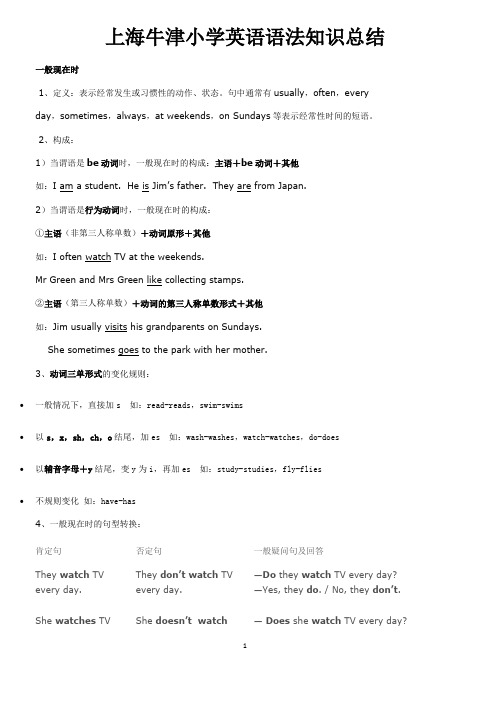
∙一般情况下,直接加s 如:read-reads,swim-swims∙以s,x,sh,ch,o结尾,加es 如:wash-washes,watch-watches,do-does ∙以辅音字母+y结尾,变y为i,再加es 如:study-studies,fly-flies∙不规则变化如:have-has4、一般现在时的句型转换:肯定句否定句一般疑问句及回答They watch TV every day.They don’t watch TVevery day.—Do they watch TV every day?—Yes, they do. / No, they don’t.She watches TV She doesn’t watch— Does she watch TV every day?every every day.—Yes, she does. / No, she doesn’t.现在进行时1、定义:表示现在或现阶段正在进行或发生的动作。
句中常有now,look,listen等词。
如:I am washing clothes now.Look! Liu Tao is climbing the tree.Listen! Jane is singing in the music room.2、构成:be动词(am/is/are)+ 动词现在分词(V-ing)3、动词现在分词构成:∙一般是在动词原形后加ing如:read-reading,drink-drinking,eat-eating,look-looking∙以不发音的e结尾的动词,去掉e,再加ing如:write-writing,make-making,ride-riding,take-taking∙以重读闭音节结尾,如末尾只有一个辅音字母,要双写这个字母,再加ing如:sit-sitting,swim-swimming,put-putting,run-running,stop-stopping,get-getting,begin-beginning,jog-jogging,forget-forgetting4、动名词其实就是动词的现在分词,它既有名词性质(可作主语),又有动词性质(可带宾语)。
七年级英语牛津版知识点
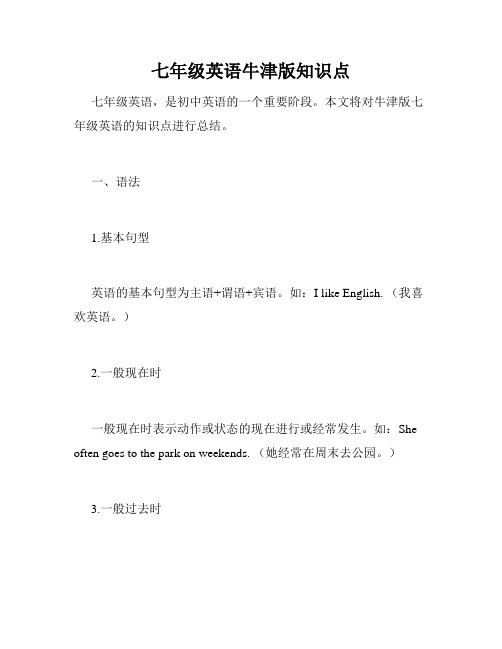
七年级英语牛津版知识点七年级英语,是初中英语的一个重要阶段。
本文将对牛津版七年级英语的知识点进行总结。
一、语法1.基本句型英语的基本句型为主语+谓语+宾语。
如:I like English. (我喜欢英语。
)2.一般现在时一般现在时表示动作或状态的现在进行或经常发生。
如:She often goes to the park on weekends. (她经常在周末去公园。
)3.一般过去时一般过去时表示过去某一时间发生的动作或状态。
如:He watched TV last night. (他昨晚看了电视。
)4.一般将来时一般将来时表示将来某一时间要发生的动作或状态。
如:I will visit my grandparents next week. (我下周会去看望我的祖父母。
)5.情态动词情态动词可以表示说话人的心情、意愿或能力等。
如:We can play basketball together. (我们可以一起打篮球。
)二、词汇1.日常生活用语学生可以学习一些日常生活用语,如问候语、询问时间、询问地址等。
如:How are you? (你好吗?)2.数字在初中英语中,学生需要学习如何用英语说和写数字。
如:twenty-three (23)3.颜色初中英语中也需要学习颜色的表达。
如:green (绿色)三、阅读理解在初中英语中,阅读理解是一个重要的环节。
学生需要阅读各种文章,从中获取信息并回答相关问题。
1.阅读短文学生可以阅读各种长度的短文,从中获取信息并进行理解。
如:Hello, my name is Mary. I live in New York with my family. I have a cat named Ginger. He is very cute. I like to play with him.2.问答题问答题是英语阅读理解中的一个重要环节。
学生需要根据文章提出的问题,回答相关问题。
牛津初中英语各单元语法目录
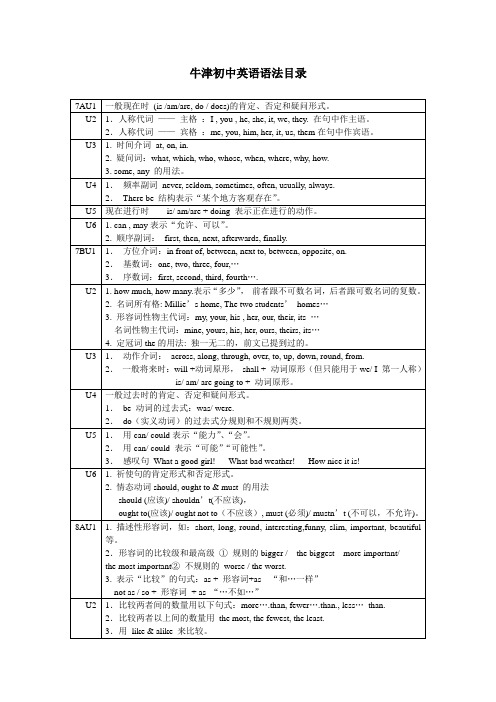
9AU1
1.句式:It is +形容词(性格)+of sb.+ (not) to do sth.
2.句式:主语+ be +形容词+enough + to do sth.
3.句子的不同成分:主语、谓语、表语、宾语、定语、状语。
3.形容词性物主代词:my, your, his , her, our, their, its…
名词性物主代词:mine, yours, his, her, ours, theirs, its…
4.定冠词the的用法:独一无二的,前文已提到过的。
U3
1.动作介词:across, along, through, over, to, up, down, round, from.
U2
1.过去进行时was / were + doing表示过去某个时刻正在进行的。
2.肯定、否定和疑问形式。
3. while和when在过去进行时中的用法。
U3
被动语态:
1.结构:be + done时态变化都只改变be的各种形式。
2.肯定、否定和疑问形式。
3.特殊动词没有被动形式。
4.主动形式表被动意义。
牛津初中英语语法目录
7AU1
一般现在时(is /am/are, do / does)的肯定、否定和疑问形式。
U2
1.人称代词——主格:I , you , he, she, it, we, they.在句中作主语。
2.人称代词——宾格:me, you, him, her, it, us, them在句中作宾语。
牛津译林版小学英语五年级上学期语法知识点汇总
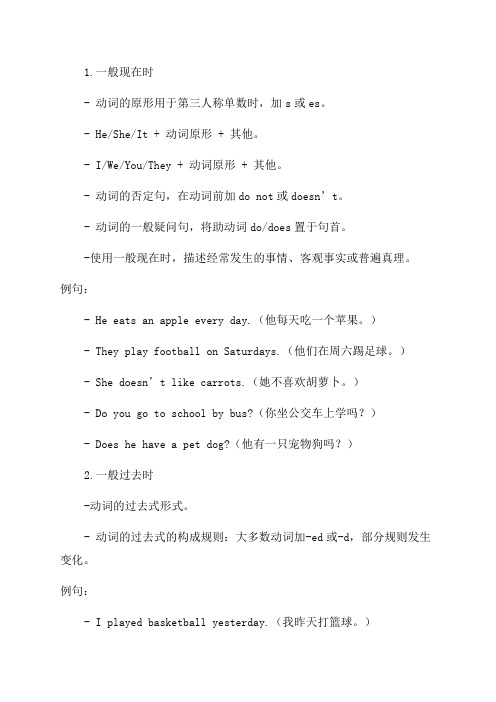
1.一般现在时- 动词的原形用于第三人称单数时,加s或es。
- He/She/It + 动词原形 + 其他。
- I/We/You/They + 动词原形 + 其他。
- 动词的否定句,在动词前加do not或doesn’t。
- 动词的一般疑问句,将助动词do/does置于句首。
-使用一般现在时,描述经常发生的事情、客观事实或普遍真理。
例句:- He eats an apple every day.(他每天吃一个苹果。
)- They play football on Saturdays.(他们在周六踢足球。
)- She doesn’t like carrots.(她不喜欢胡萝卜。
)- Do you go to school by bus?(你坐公交车上学吗?)- Does he have a pet dog?(他有一只宠物狗吗?)2.一般过去时-动词的过去式形式。
- 动词的过去式的构成规则:大多数动词加-ed或-d,部分规则发生变化。
例句:- I played basketball yesterday.(我昨天打篮球。
)- She didn’t wat ch TV last night.(昨晚她没看电视。
)- Did you visit your grandparents last weekend?(你上周末去看望你的祖父母了吗?)- Did they have breakfast at home this morning?(他们今天早上在家吃早餐了吗?)3.现在进行时- am/is/are + 动词的ing形式 + 其他。
-表示现在正在进行的动作。
-“现在正在进行”可以和“现在正在发生”混淆,要根据上下文进行判断。
例句:- She is eating lunch now.(她现在正在吃午饭。
)- They are playing basketball in the park.(他们正在公园打篮球。
牛津英语Unit1语法一般现在时
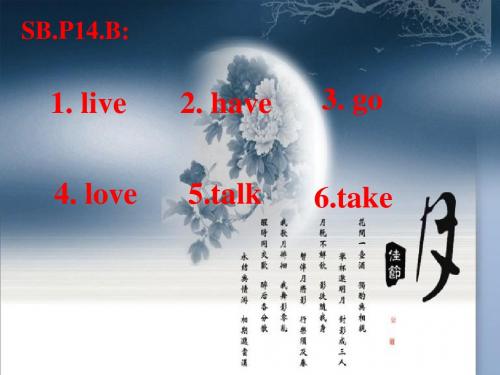
I am a student of No. 1 Middle school. I am thirteen years old. I have a round face, two big eyes and a small mouth. I think I am a lovely girl. I have a brother. He is fifteen years old. He is in a school tennis team. He is good at it.He often plays tennis with his classmates on a tennis court at weekends. But he doesn’t like playing it with me, because I am not good at it.
(6) Do
Yes, they do.
Unit 1 This is me
Grammar (2)
Simple present tense
?
Grammar: 2. Verb “ to do”
陈述句:(肯定句和否定句)
I come from Suqian. I don’t come from Suqian. Daniel wears glasses. Daniel doesn’t wear glasses.
What does he usually do after school?
动词的第三人称单数构成 1 直接在动词后面加 s bring brings read reads cook cooks use uses 2 以 sh,ch, s, x 和 o结尾的动词加 es miss misses finish finishes go goes watch watches fix teach fixes teaches
牛津译林版八年级英语上册Unit3语法重点总结
牛津译林版八年级英语上册Unit3语法重点总结一、一般现在时 (Simple Present Tense)- 表示经常性的动作、惯或事实- 常用的时间状语:always, usually, often, sometimes, everyday/week/month/year二、一般过去时 (Simple Past Tense)- 表示过去发生的动作或状态- 常用的时间状语:yesterday, last week/month/year, in 2010, etc.三、现在进行时 (Present Continuous Tense)- 表示现在正在进行的动作- 结构:主语 + am/is/are + 动词的现在分词 (-ing)- 常用的时间状语:now, at the moment, currently, etc.四、过去进行时 (Past Continuous Tense)- 表示过去某个时间正在进行的动作- 结构:主语 + was/were + 动词的现在分词 (-ing)- 常用的时间状语:at that time, while, etc.五、一般将来时 (Simple Future Tense)- 表示将来发生的动作或情况- 结构:主语 + will + 动词原形- 常用的时间状语:tomorrow, next week/month/year, in the future, etc.六、现在完成时 (Present Perfect Tense)- 表示过去发生的动作对现在产生的影响或结果- 结构:主语 + have/has + 动词的过去分词- 常用的时间状语:already, yet, so far, recently, etc.七、过去完成时 (Past Perfect Tense)- 表示过去某个时间或动作之前已经完成的动作- 结构:主语 + had + 动词的过去分词- 常用的时间状语:before, after, by the time, etc.八、将来完成时 (Future Perfect Tense)- 表示将来某个时间之前已经完成的动作- 结构:主语 + will have + 动词的过去分词- 常用的时间状语:by next week/month/year, etc.九、情态动词 (Modal Verbs)- 表示能力、可能性、允许性、必要性等- 常用的情态动词:can, could, may, might, must, shall, should, ought to, will, would以上是牛津译林版八年级英语上册Unit 3的语法重点总结。
语法汇总牛津译林版英语七年级上册
Unit 1--2【语法精讲】一、一般现在时的构成主要用动词原形_______/________表示,如果主语是第三人称单数,则用动词的________。
e.g. He is an interesting actor. We all like him.【小试牛刀】1. Amy and Kitty are good friends.否定句:____________________________________.一般疑问句:________________________________?特殊疑问句:________________________________?2. She does his homework every night.否定句:____________________________________.一般疑问句:________________________________?特殊疑问句:________________________________?二、一般现在时的用法1.表示经常性或习惯性的动作或存在的状态。
常与频率的副词和时间状语连用。
时间状语:______________________________________________________.频率副词进行排序:______________________________________________.★频度副词的位置一般放在be动词__________,行为动词__________.[译]①她有时很忙。
She __________________________________________.②我们经常去那儿。
We_______________________________________.★对频度副词提问要用______________.[例]Isometimes write to my cousin Andy.(对划线部分提问)__________________ do you write to your cousin Andy?【小试牛刀】1. I don’t think fast food is good for our health, so I __________ go to McDonald’s.A. seldomB. alwaysC. usuallyD. often2. --Steve, _______ do you play basketball after school?--Twice a week. It can keep me healthy.A. how farB. how soonC. how longD. how often★2.表示_______________________e.g.The earth______________(be) round.在时间状语从句和条件状语从句中,主句是___________,从句用_____________。
牛津版八年级英语上册语法知识点总结
牛津版八年级英语上册语法知识点总结1. 时态1.1 一般现在时- 表示经常发生的动作或存在的状态。
- 构成:主语 + 动词原形。
1.2 一般过去时- 表示过去发生的动作或存在的状态。
- 构成:主语 + 动词过去式。
1.3 一般将来时- 表示将来会发生的动作或存在的状态。
- 构成:主语 + 情态动词(will/shall)+ 动词原形。
2. 被动语态2.1 被动语态的构成- 一般现在时:主语 + am/is/are + 过去分词。
- 一般过去时:主语 + was/were + 过去分词。
- 一般将来时:主语 + will be + 过去分词。
2.2 被动语态的用法- 强调动作的承受者。
- 表示动作的执行者不重要或未知。
3. 情态动词3.1 情态动词的用法- can表示能力或可能性。
- may表示请求或允许。
- must表示肯定推测或强制。
- should表示应该或建议。
- shall表示承诺或警告。
- will表示意愿或将来时。
3.2 情态动词的辨析- can和may表示可能性,但can表示能力时不能用may替换。
- must表示肯定推测时,后句用否定形式;表示强制时,后句用肯定形式。
- shall和will表示意愿,但shall用于第一人称,will用于第三人称。
4. 句子结构4.1 简单句- 包含一个主语和一个谓语。
- 例如:The cat sleeps.4.2 并列句- 包含两个或多个主语和谓语,用并列连词连接。
- 例如:The cat sleeps, and the dog barks.4.3 复合句- 包含一个主句和一个或多个从句。
- 例如:The cat sleeps when the sun sets.4.4 复杂句- 包含一个主句和两个或多个从句。
- 例如:The cat sleeps when the sun sets, and the dog barks at night.5. 疑问句5.1 一般疑问句- 采用倒装结构,将助动词或情态动词移至主语前。
初中英语牛津教材知识点归纳梳理
初中英语牛津教材知识点归纳梳理英语作为一门国际通用语言,在初中阶段成为了学生学习的必修课程。
牛津教材是初中英语教育中常用的教材之一,通过系统的知识点和任务训练,培养学生的英语能力。
下面将对初中英语牛津教材的知识点进行归纳梳理,帮助学生更好地掌握和理解英语知识。
一、语法知识点1. 时态:牛津教材涉及的时态包括一般现在时、一般过去时、现在进行时、过去进行时、一般将来时等。
学生需要掌握各个时态的构成和用法,并能运用于实际场景中。
2. 从句:牛津教材中包含了名词从句、定语从句和状语从句等,学生需要了解从句的结构和引导词的用法,并能够熟练运用从句进行句子的扩展和修饰。
3. 词性和词组搭配:掌握名词、动词、形容词、副词等词性的构成和用法,以及常用的词组搭配,能够在句子中正确地使用词性和词组。
4. 被动语态:理解被动语态的构成和用法,能够根据语境进行主动语态和被动语态之间的转换。
二、词汇知识点1. 基础词汇:学生需要掌握牛津教材中出现的基础词汇,包括常见的名词、动词、形容词、副词等,并能够理解其词义和用法。
2. 扩展词汇:牛津教材中也会出现一些扩展词汇,学生需要积累并掌握这些词汇,以拓宽自己的词汇量。
3. 词组和固定搭配:学生需要掌握一些常用的词组和固定搭配,能够在实际应用中灵活运用。
三、听力技巧1. 听力材料:牛津教材中的听力材料多样化,包括对话、短文、新闻等,学生需要通过多听多练,提高听力理解能力。
2. 关键词识别:在听力过程中,学生需要学会辨别和记忆关键词,帮助理解和获取听力材料中的信息。
3. 笔记和总结:学生可以在听力过程中做笔记并进行总结,帮助记忆和回顾听力内容。
四、阅读技巧1. 阅读理解:学生需要掌握各类阅读题型的解题技巧,包括选择题、判断题、填空题等,能够准确地获取阅读材料中的信息。
2. 快速阅读:通过训练提高阅读速度,提高对文章整体结构的理解能力。
3. 阅读策略:学生需要学会使用不同的阅读策略,如扫读、略读、精读等,根据需要选择合适的策略进行阅读。
- 1、下载文档前请自行甄别文档内容的完整性,平台不提供额外的编辑、内容补充、找答案等附加服务。
- 2、"仅部分预览"的文档,不可在线预览部分如存在完整性等问题,可反馈申请退款(可完整预览的文档不适用该条件!)。
- 3、如文档侵犯您的权益,请联系客服反馈,我们会尽快为您处理(人工客服工作时间:9:00-18:30)。
牛津英语英语语法(三)一般现在时一. 一般现在时行为动词词型变化形式一般现在时动词只有第三人称有词形变化,其他人称动词均用原形单数第三人称动词变化:多数在动词后加s play—plays like—likes ,以s,x,sh,ch,o结尾的动词加es go—goes wash--washes,以辅音字母加y结尾,把y改i再加es fly—flies study--studies二. 一般现在时动词be和have的变化形式1.动词Be 叫连系动词, 连系动词be的用法:除了第一人称单数用am,和第三人称单数用is以外,其它人称用are。
I am busy. You are busy. He (She) is busy. We (You, They) are busy.2.动词have的用法:除了第三人称单数用has以外,其它人称一律用have。
如:I have a pen. You have a pen. She (He) has a pen.We (You, They) have pens.三. 一般现在时的句型1.肯定句构成:主语+动词(注意人称变化) +其它成分Ihave a dog. We like the little cat. She sings well.2.否定句构成:行为动词的否定句:主语+助动词(do/does) + not +动词原形+其它成分He dosen’t have a dog.He isn’t young.We don’t like the little cat.(借助于助动词do) She doesn’t sing well. (借助于助动词does)3.一般疑问句:A.行为动词的一般疑问句:助动词(do/does)+主语+动词原形+ 其它成分Do you like i t? Yes, I do. / No. I don’t .Does he(she) like it? Yes, he( she )does. / No, he ( she )doesn’t.B. 动词BE 的一般疑问句Am / Is /Are +主语+ 其它成分Are you a teacher? Yes, I am. / No, I am not.Are they students of your school.Yes they are / No they aren,t.4.特殊疑问句:特殊疑问词+ 一般疑问句How many students are there in your school?What do you usually do on Sunday?四.一般现在时的用法1.经常性或习惯性的动作,常与表示频度的时间状语连用。
如:every year, sometimes, at 5 o’clock, on Sunday.I get up at six o’clock every day.He gets up at six o’clock every da y.She smokes too much.I telephone to my parents once a week.2.表达客观真理,科学事实。
如果出现在宾语从句中,即使主句是过去时,从句谓语也要用一般现在时。
Three and four makes seven.The teacher told us that the earth moves around the sun.Shenyang lies in the north of China.3.在格言或名言警句中。
Pride goes before a fall. 骄必败。
Actions speak louder than words.事实用于雄辩。
4.表示现在的状态、性格、个性。
I don’t want more, thanks.He is a good student. He is always ready to help others.五.一般现在时其它用法一般现在时表将来1.含有go, come, return, arrive, leave, start, begin等动词的一般现在时表将来。
表示在时间上已确定或安排好的事情。
The school bus leaves at eight .2.在时间或条件句中。
When Tom comes, ask him how to fix the tap.I’ll help you as soon as I arrive there.3.在动词hope,take care that,make sure that等后。
I hope she has a good time.Before you leave the room, please make sure that the door is closed.4.时间状语从句,条件句中,从句中(常含有till , once , as soon as ,when , while , before , after , so long as , by the time , if , in case ,unless , even if , whether , the moment , the minute )Eg. As soon as I get there, I will deal with this matter.Whether he is happy is an important thing to her.5.倒装句,表示动作正在进行Here comes the teacher!= The teacher is coming.There goes the bell. = The bell is ringing.Here comes the car. = The car is coming.一般现在时表过去1."书上","报纸上"的叙述。
The newspaper says that the president will retire next month.2.叙述往事,使其生动。
Napoleon’s army now advances and the great battle begins.一般现在时表完成1.动词用一般现在时代替完成时:hear , tell , learn , write , understand , forget , know , find , say, remember.Eg.I hear (= have heard) he will go to Paris.I forget (=have forgotten) how to read the word.2.句型" It is … since… " = " It has been … since …"It is (= has been) five years since we last met.一般现在时表进行1.句型:Here comes…;There goes…Eg: Look, here comes Mr. Brown.六. 注意事项1.在英国,人们常用have got代替have,特别在疑问句和否定句中。
2.当have如果不表示“有”时,构成疑问或否定句时,就借助于助动词do, does, don’t或者doesn’t.练习一.用词的适当形式填空。
1.What time_________ his father_________(do) the work?2.He _________(get) up at five o’clock.3.__________ you _________(brush) your teeth every morning.4.What ________ ( do ) he usually ________( do ) after school?5.Tom ________ ( study ) English, Chinese, Maths, Science and Art at school.6. Kitty sometimes __________(go) to the park with his sister.7.At eight at night, she __________( watch ) TV with her parents.8. ________ Mike________( read ) English every day?9.How many lessons________ your classmates______( have ) on Monday?10.We often___________ ( play ) football in the playground.二.选择() 1. _____ you have a book?A. DoB. AreC. IsD. Have()2. They _________ on a farm.A. workingB. is workC. workD. is worked() 3. Does Peter like to watch TV?__________.A. Yes, he likeB. No, he doesn’tC. Yes, he’d likeD. No, he likes()4. She doesn’t __________ her homework in the afternoon.A. doingB. to doC. doesD. do()5. How ____________ Mr. Brown ___________ to America?A. do,goB. is,goC. does,goD. does,goes()6. Where’s my camera? I____________ it.A. am not findingB. am not seeingC. can’t findD. can’t lo ok at()7. How ___________ he go to work? He ___________ to work by bike.A. does ;goB. do;goesC. do ;goD. does;goes()8. ______ you usually late for school? No, _____________.A. Do ; I amB. Does ;notC. Are ; I’m notD. Are ; I aren’t()9. _____ she _____ home at six every day?A. Is , leaveB. Does , leaveC. Is , leavesD. Does , left()10. Mr. Yang ____________ English this term.A. teaches ourB. teaches usC. teachs usD. teach our答案:一.1.does, do 2. gets 3. Do, brush 4. does, do 5. studies 6. goes7. watches8. Does, read9. do, have10. play二.1---5 A C B D C6---10 C D C B B。
